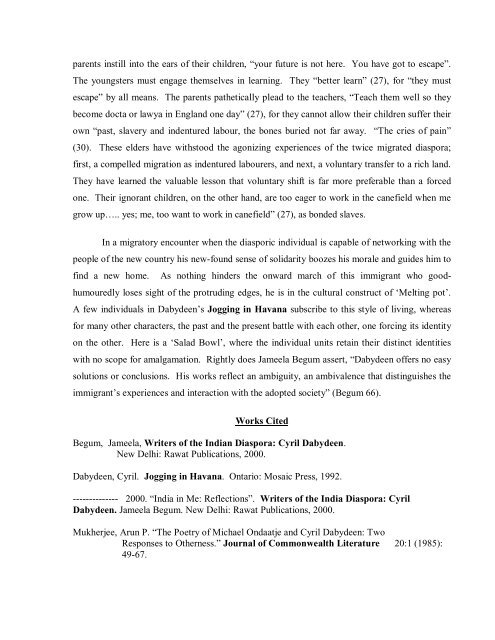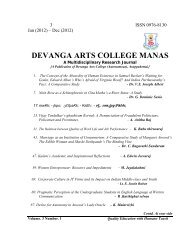A Multidisciplinary Research Journal - Devanga Arts College
A Multidisciplinary Research Journal - Devanga Arts College
A Multidisciplinary Research Journal - Devanga Arts College
Create successful ePaper yourself
Turn your PDF publications into a flip-book with our unique Google optimized e-Paper software.
parents instill into the ears of their children, “your future is not here. You have got to escape”.<br />
The youngsters must engage themselves in learning. They “better learn” (27), for “they must<br />
escape” by all means. The parents pathetically plead to the teachers, “Teach them well so they<br />
become docta or lawya in England one day” (27), for they cannot allow their children suffer their<br />
own “past, slavery and indentured labour, the bones buried not far away. “The cries of pain”<br />
(30). These elders have withstood the agonizing experiences of the twice migrated diaspora;<br />
first, a compelled migration as indentured labourers, and next, a voluntary transfer to a rich land.<br />
They have learned the valuable lesson that voluntary shift is far more preferable than a forced<br />
one. Their ignorant children, on the other hand, are too eager to work in the canefield when me<br />
grow up….. yes; me, too want to work in canefield” (27), as bonded slaves.<br />
In a migratory encounter when the diasporic individual is capable of networking with the<br />
people of the new country his new-found sense of solidarity boozes his morale and guides him to<br />
find a new home. As nothing hinders the onward march of this immigrant who good-<br />
humouredly loses sight of the protruding edges, he is in the cultural construct of ‘Melting pot’.<br />
A few individuals in Dabydeen’s Jogging in Havana subscribe to this style of living, whereas<br />
for many other characters, the past and the present battle with each other, one forcing its identity<br />
on the other. Here is a ‘Salad Bowl’, where the individual units retain their distinct identities<br />
with no scope for amalgamation. Rightly does Jameela Begum assert, “Dabydeen offers no easy<br />
solutions or conclusions. His works reflect an ambiguity, an ambivalence that distinguishes the<br />
immigrant’s experiences and interaction with the adopted society” (Begum 66).<br />
Works Cited<br />
Begum, Jameela, Writers of the Indian Diaspora: Cyril Dabydeen.<br />
New Delhi: Rawat Publications, 2000.<br />
Dabydeen, Cyril. Jogging in Havana. Ontario: Mosaic Press, 1992.<br />
-------------- 2000. “India in Me: Reflections”. Writers of the India Diaspora: Cyril<br />
Dabydeen. Jameela Begum. New Delhi: Rawat Publications, 2000.<br />
Mukherjee, Arun P. “The Poetry of Michael Ondaatje and Cyril Dabydeen: Two<br />
Responses to Otherness.” <strong>Journal</strong> of Commonwealth Literature 20:1 (1985):<br />
49-67.



